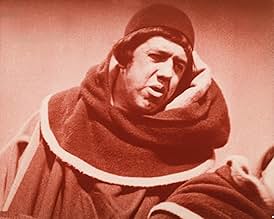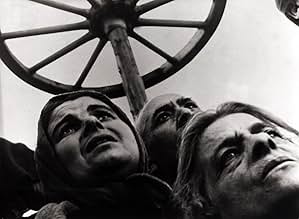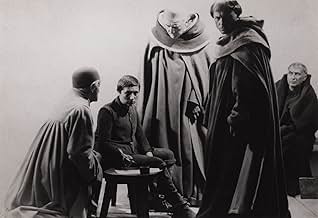Eine Chronik des Prozesses gegen die der Ketzerei angeklagten Jungfrau von Orléans und der Anstrengungen ihrer kirchlichen Richter, sie zur Widerrufung ihrer heiligen Visionen zu zwingen.Eine Chronik des Prozesses gegen die der Ketzerei angeklagten Jungfrau von Orléans und der Anstrengungen ihrer kirchlichen Richter, sie zur Widerrufung ihrer heiligen Visionen zu zwingen.Eine Chronik des Prozesses gegen die der Ketzerei angeklagten Jungfrau von Orléans und der Anstrengungen ihrer kirchlichen Richter, sie zur Widerrufung ihrer heiligen Visionen zu zwingen.
- Regie
- Drehbuch
- Hauptbesetzung
- Auszeichnungen
- 4 Gewinne & 1 Nominierung insgesamt
Maria Falconetti
- Jeanne d'Arc
- (as Mlle Renée Falconetti)
Eugene Silvain
- Évêque Pierre Cauchon (Bishop Pierre Cauchon)
- (as Eugène Silvain)
Louis Ravet
- Jean Beaupère
- (as Ravet)
Armand Lurville
- Juge (Judge)
- (as André Lurville)
Jean Aymé
- Juge (Judge)
- (Nicht genannt)
Camille Bardou
- Richard Beauchamp, 13th Earl of Warwick
- (Nicht genannt)
Gilbert Dacheux
- Juge (Judge)
- (Nicht genannt)
Gilbert Dalleu
- Jean Lemaître
- (Nicht genannt)
Paul Delauzac
- Martin Ladvenu
- (Nicht genannt)
Dimitri Dimitriev
- Juge (Judge)
- (Nicht genannt)
Zusammenfassung
Reviewers say 'The Passion of Joan of Arc' is celebrated for its innovative close-ups, emotional intensity, and pioneering silent film techniques. Renée Falconetti's performance is lauded for its subtlety and expressiveness. The film delves into themes of faith, power, and human spirit, contrasting Joan's purity with her accusers' corruption. Critics praise Dreyer's meticulous direction and the film's historical significance. Some find the silent format and close-ups challenging, yet it remains a landmark in cinematic achievement.
Empfohlene Bewertungen
Carl Dreyer's "The Passion of Joan of Arc" is a film that feels light years ahead of its time. Lean and mean, focusing its entire narrative on the interrogation of Joan that inevitably lead to her execution by burning at the stake, the film is kinetic in ways that most films even now aren't. Composed almost completely of tight close ups, Dreyer and crew cut rapidly between disconcerting, asymmetrical shots, giving the film a breathless, anxious, nearly frenzied pace.
Maria Falconetti gives an almost unbelievably intense performance as the title heroine. Her performance, and the film in general, does get a bit monotonous -- it exists primarily of impassioned gazes into the middle distance, giant, tearing eyes opened wide, an expression of passionate, nearly demented religious fervor on her face. It's not a film that concerns itself with characters and plot, so we don't get to know Joan as a person. It's difficult to care for her particular plight and we instead feel compassion for her as one human being feeling compassion for another. For that reason, the film left me remembering its striking images and formal style more than any emotions I might have felt while watching it. But it's no less of a remarkable cinematic achievement for that.
Grade: A
Maria Falconetti gives an almost unbelievably intense performance as the title heroine. Her performance, and the film in general, does get a bit monotonous -- it exists primarily of impassioned gazes into the middle distance, giant, tearing eyes opened wide, an expression of passionate, nearly demented religious fervor on her face. It's not a film that concerns itself with characters and plot, so we don't get to know Joan as a person. It's difficult to care for her particular plight and we instead feel compassion for her as one human being feeling compassion for another. For that reason, the film left me remembering its striking images and formal style more than any emotions I might have felt while watching it. But it's no less of a remarkable cinematic achievement for that.
Grade: A
This film almost leads one to believe that sound betrays the emotion the eyes capture. Just as the blind develop hearing far better than the average, the deaf develop a keen sense of sight. I am convinced that a lack of dialogue forces us to read the language of the face and body, a verbage unmatched in beauty and nuance. Though the accompanying musical piece (be careful not to identify it as a score), so deliciously inspired by the film, enhances the visual playground; it is the actors' faces that comprise this tour de force. Ms. Falconetti shifts from worry and doubt to unabashed conviction in a single shot, giving the viewer the luck of seeing one's thoughts in progress. She needs no response to the interrogation, it's all in her face. Renee is not superficially beautiful and the lack of make-up only reinforces how bare Joan is, but it is the uncanny ability of an incomparable stage actor to be a window into the soul that makes her so stunning, for the soul we see is one we only wish to attain for ourselves. The Church sees what we see, and they respond just as clearly to her unspoken protest with vehement pomp. The cinematography is so astounding for its time no comment could ever do it justice. Though many comments can be made, and are, surrounding the inspiration and detail for the set, it is at its core an incredible gift from Dreyer to the actors meant to inspire. It plays little part in the film, but to pull an inconceivable last drop of reality from the actors. A testament I can imagine will never be matched to the incredible power of silence.
A certain amount of credit must surely be paid to the director for the genius of 'La Passion de Jeanne d'Arc.' The daring camera angles, use of incessant close-ups and peculiar authenticity all may be attributed to Carl Th. Dryer. However, Renee Maria Falconetti is the reason this film indeed surpasses all attempts at reaching the Platonic form of brilliance. Her performance is breathtaking by all accounts. One can not help but remain mesmerized by her expressions. Yes Dryer's gift to us of so many wonderful close shots of Falconetti should be acknowledged. He must be praised for his relentless filming of scenes to produce the desired result. Yet to imagine anyone else in this timeless role (such as Lillian Gish who was said to have been considered) is to envision a less than perfect film. Unimpeded by the silent medium in which she worked, Falconetti's mere tilt of the head or gentle glance pierce the soul of the viewer. We see her speak in Jeanne's native tongue. We see her compelling portrayal of the anguish which the saint most certainly endured. It is almost as if we are watching what the director said he had found; the martyr's reincarnation! This actress presents to us her raw beauty unmarred by powders or makeup - thanks to a decision of Dryer. How bitter-sweet the fact that we have this once thought to be lost silent film and yet can not help now but to long for more Falconetti. And so we return to 'La Passion de Jeanne d'Arc' and with each of many tears and inaudible sighs marvel at the staggering accomplishment which is Renee Maria Falconetti's Jeanne.
10judokid
I saw this a few months ago on the big screen, just after Nosferatu, another silent classic. Both showings were supported by a live organ play, which has been composed directly for the movie, and which suited perfectly. I had seen Nosferatu before, but i didn´t know anything about `Jeanne`, and so i was in no way prepared for this overwhelming, soul-rapturing experience.
My eyes were immediately glued to the screen. Unfortunately i had missed the first minutes, so it started for me with the first (?) court scene. The camera wandered through the faces of the court members, circled and focussed on Jeanne´s face. So beautiful, naked, strong and defenseless! I could rave on the technical perfection of this film, it´s clever editing, innovative and gorgeous cinematography, proper historical settings and pure storytelling. Carl Theodor Dreyer created a masterpiece. But the most outstanding feature of this silent are the performances; Maria Falconetti delivers simply the best performance of all times, and i can´t remember of any ´corny` overacting, which distracts most silent movies from the modern viewer, even the accepted classics. `La passion de Jeanne d´Arc´ is purest cinematic art, timeless in every sense.
My eyes were immediately glued to the screen. Unfortunately i had missed the first minutes, so it started for me with the first (?) court scene. The camera wandered through the faces of the court members, circled and focussed on Jeanne´s face. So beautiful, naked, strong and defenseless! I could rave on the technical perfection of this film, it´s clever editing, innovative and gorgeous cinematography, proper historical settings and pure storytelling. Carl Theodor Dreyer created a masterpiece. But the most outstanding feature of this silent are the performances; Maria Falconetti delivers simply the best performance of all times, and i can´t remember of any ´corny` overacting, which distracts most silent movies from the modern viewer, even the accepted classics. `La passion de Jeanne d´Arc´ is purest cinematic art, timeless in every sense.
One of the last great silent films made during the advent of sound, Carl-Theodor Dreyer's The Passion of Joan of Arc is a haunting, riveting portrait of the historical martyr based on documentation from the original trial. Focusing primarily on the series of courtroom examinations that doomed the young warrior, the film gloriously employs vivid close-ups to accentuate the ordinariness (while at the same time exaggerating the most grotesque qualities) of Joan's inquisitors. Maria Falconetti is unforgettable as Joan, perfectly distilling the pain, terror, and saintliness required by what is probably one of the most demanding roles an actor could attempt. The consequence of Joan's conviction -- her burning at the stake -- allows Dreyer to hammer home his exquisite visual motif balancing erotic corporeality with transcendent spirituality.
Wusstest du schon
- WissenswertesAfter completing the original cut of the film, director Carl Theodor Dreyer learned that the entire master print had been destroyed accidentally. With no ability to reshoot, Dreyer re-edited the entire film from footage he had originally rejected.
- PatzerIn the 15th century, a priest can be seen wearing a Jesuit robe. The Jesuit order was founded in the 16th century.
- Zitate
Jeanne d'Arc: Dear God, I accept my death gladly but do not let me suffer too long. Will I be with You tonight in Paradise?
- Alternative VersionenIn the 1930s, a one-hour synchronized sound version was reissued under the name "The Immortal Saint" using David Ross as a narrator to replace intertitles.
- VerbindungenEdited into From Camille to Joan of Arc (1961)
Top-Auswahl
Melde dich zum Bewerten an und greife auf die Watchlist für personalisierte Empfehlungen zu.
- How long is The Passion of Joan of Arc?Powered by Alexa
Details
Box Office
- Bruttoertrag in den USA und Kanada
- 21.877 $
- Eröffnungswochenende in den USA und in Kanada
- 6.408 $
- 26. Nov. 2017
- Weltweiter Bruttoertrag
- 22.731 $
- Laufzeit
- 1 Std. 50 Min.(110 min)
- Farbe
- Sound-Mix
- Seitenverhältnis
- 1.33 : 1
Zu dieser Seite beitragen
Bearbeitung vorschlagen oder fehlenden Inhalt hinzufügen






























